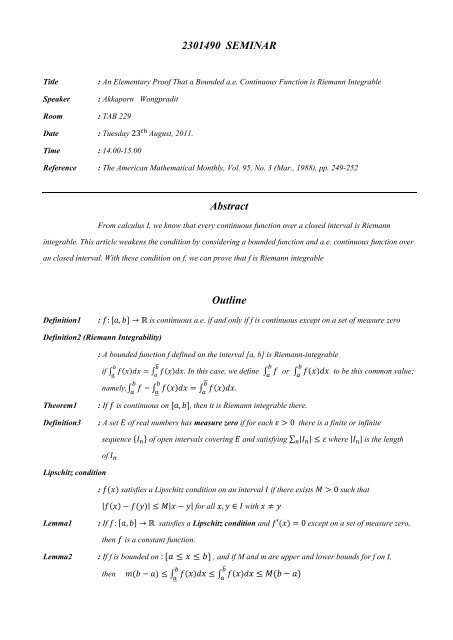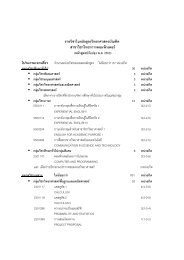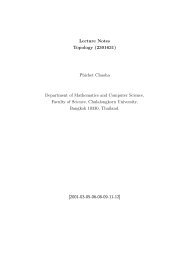2301490 SEMINAR Abstract Outline
2301490 SEMINAR Abstract Outline
2301490 SEMINAR Abstract Outline
Create successful ePaper yourself
Turn your PDF publications into a flip-book with our unique Google optimized e-Paper software.
<strong>2301490</strong> <strong>SEMINAR</strong><br />
Title : An Elementary Proof That a Bounded a.e. Continuous Function is Riemann Integrable<br />
Speaker : Akkaporn Wongpradit<br />
Room : TAB 229<br />
Date : Tuesday 23 August, 2011.<br />
Time : 14.00-15.00<br />
Reference : The American Mathematical Monthly, Vol. 95, No. 3 (Mar., 1988), pp. 249-252<br />
<strong>Abstract</strong><br />
From calculus I, we know that every continuous function over a closed interval is Riemann<br />
integrable. This article weakens the condition by considering a bounded function and a.e. continuous function over<br />
an closed interval. With these condition on f, we can prove that f is Riemann integrable<br />
<strong>Outline</strong><br />
Definition1 : f: [a, b] → R is continuous a.e. if and only if f is continuous except on a set of measure zero<br />
Definition2 (Riemann Integrability)<br />
: A bounded function f defined on the interval [a, b] is Riemann-integrable<br />
<br />
<br />
<br />
if ∫ f(x)dx = ∫ f(x)dx. In this case, we define ∫ f or<br />
<br />
<br />
<br />
∫ f(x)dx to be this common value;<br />
<br />
<br />
<br />
namely,∫ f<br />
.<br />
=<br />
<br />
∫ f(x)dx = ∫ f(x)dx<br />
<br />
<br />
Theorem1 : If f is continuous on [a, b], then it is Riemann integrable there.<br />
Definition3 : A set E of real numbers has measure zero if for each ε > 0 there is a finite or infinite<br />
sequence {I } of open intervals covering E and satisfying ∑ |I |<br />
of I <br />
Lipschitz condition<br />
: f(x) satisfies a Lipschitz condition on an interval I if there exists M > 0 such that<br />
|f(x) − f(y)| ≤ M|x − y| for all x, y ∈ I with x ≠ y<br />
≤ ε where |I | is the length<br />
Lemma1 : If f: [a, b] → R satisfies a Lipschitz condition and f′(x) = 0 except on a set of measure zero,<br />
then f is a constant function.<br />
Lemma2 : If f is bounded on : {a ≤ x ≤ b} , and if M and m are upper and lower bounds for f on I,<br />
<br />
<br />
then m(b − a) ≤ ∫ f(x)dx ≤ ∫ f(x)dx ≤ M(b − a)
Lemma3<br />
Lemma4<br />
Lemma5<br />
Theorem2<br />
: If f is bounded on : {a ≤ x ≤ b} , and c is an intermediate point,<br />
<br />
then ∫ f(x)dx<br />
<br />
and<br />
<br />
∫ f(x)dx<br />
<br />
<br />
= ∫ f(x)dx<br />
<br />
<br />
= ∫ f(x)dx<br />
<br />
<br />
+ ∫ f(x)dx<br />
<br />
<br />
+ ∫ f(x)dx<br />
<br />
: Suppose that f is bounded on I: {a ≤ x ≤ b}<br />
Let F and G be defined on I by<br />
<br />
<br />
F(x) ≡ ∫ f(t)dt and G(x) =<br />
<br />
∫ f(t)dt , {a < x ≤ b} , and F(a)=G(a)=0.<br />
<br />
Then F'(x )=G'(x )=f (x ) at each point x of I at which f is continuous.<br />
(At a and b, the derivatives are of course one-sided )<br />
: If a, b ∈ R such that |a − b| ≤ ε for all ε > 0, then a=b<br />
: If f: [a, b] → R is bounded, and continuous except on a set of measure zero, then f is Riemann<br />
integrable on [a, b]





